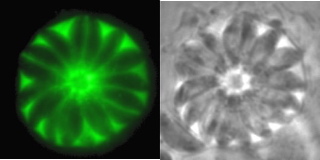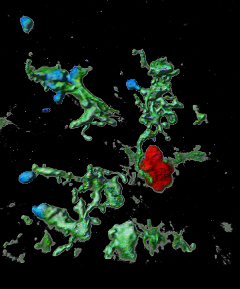UC Berkeley Press Release
Parasite vaccines within reach
BERKELEY – Even though parasites are complex creatures, the mammalian immune response to them is surprisingly simple, leading University of California, Berkeley, researchers to predict that creating vaccines for parasitic diseases such as malaria may be more straightforward than initially thought.
 Toxoplasma gondii (green) dividing inside an infected human cell. (Boris Striepen/University of Georgia) |
In the study, which was published online in the journal Nature Immunology on June 29, Nilabh Shastri, an immunologist at UC Berkeley, and his colleagues identified the unique Toxoplasma protein involved in the mouse immune response and generated the first successful Toxoplasma vaccine.
This finding could have important implications for other parasitic diseases, said Shastri, the study's lead author. If our bodies respond to similar parasites such as malaria in the same way, finding vaccines for these parasites may be more feasible than originally thought, he said.
"The entire immune response can be boiled down to one protein," Shastri said. "This could be a general principle of immunity to parasites - that the immune system focuses on one or a few particular proteins."
Parasitic diseases are a global problem. Because parasites are more closely related to human cells than bacteria or viruses, it is difficult to design drugs that will kill parasites but won't harm us, Shastri said. And because parasites are such complicated organisms, researchers often don't know where to start in creating vaccines. For example, scientists have been searching for a working malaria vaccine for years with no success.
 A cyst containing Toxoplasma gondii parasites (red) is surrounded by infected cells (green) and T cells (blue) in the brain of an infected mouse. (Marie Schaeffer and Ellen Robey/UC Berkeley) |
All of our cells have the ability to signal their contents to the immune system. When cells are infected, they chop up the infectious invader and transport bits of them from the inside of the cell to the outside where the T cells can see it and mount their response to the disease. These presented "bits" can be from any protein of the infectious agent.
Shastri's group didn't know what kind of "bit" it would find at the start of its study. Very little was known about how our immune systems hold the parasite at bay.
Many people are already infected with Toxoplasma, but it is held in check by their immune systems. If the immune system is weakened, as in AIDS patients, Toxoplasma can infect every cell in the body, forming potentially fatal cysts in the patient's brain.
To study how mice notify their immune systems of a Toxoplasma infection, the scientists mixed mouse T cells with cells expressing the gene for each Toxoplasma protein and looked for the ones that prompted a response in the T cells.
To the researchers' surprise, the immune cells recognized only one Toxoplasma protein. The scientists then fed the T cells small pieces of this protein and found that the cells respond only to one specific piece, comprising less than 5 percent of the total protein.
Mice that couldn't present this fragment on their infected cells died when exposed to Toxoplasma - their immune systems couldn't recognize the invaders and prevent the infection from running rampant.
The group reasoned that if this piece of a Toxoplasma protein was provoking an immune response on its own, perhaps the fragment could be used as a vaccine. Vaccines expose the body to a harmless part of the pathogen to ramp up the immune response. When Shastri's group injected mice with the peptide, the mice became immune to Toxoplasma infection.
"Mice and humans have almost identical immune systems," Shastri said. "Hence, lessons from mice may be applicable to humans."
Shastri's group plans to set up future collaborations with researchers studying humans to test whether the same peptide could be used as a vaccine for toxoplasmosis in people. Pregnant women could potentially be vaccinated against toxoplasmosis to protect their fetuses, Shastri said.
Shastri hopes his findings might give malaria and other parasite researchers a place to start. He thinks the techniques his group used to find the single target protein in Toxoplasma could be used for other parasites.
"If these findings hold true for other parasites, then the identification of these proteins would be key to making vaccines," Shastri said.
The study's co-authors are Nicolas Blanchard, Federico Gonzalez, Marie Schaeffer, Nathalie Joncker, Tiffany Cheng, Anjali Shastri and Ellen Robey, all of the department of molecular and cellular biology at UC Berkeley. The full study is available on the Nature Immunology website.
The National Institutes of Health and the international Human Frontier Science Program helped fund this research.

